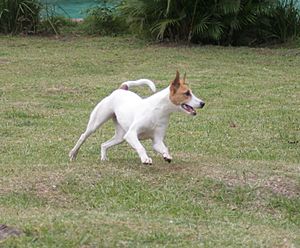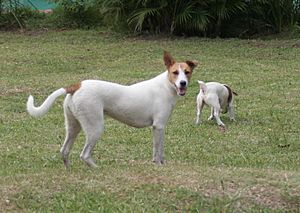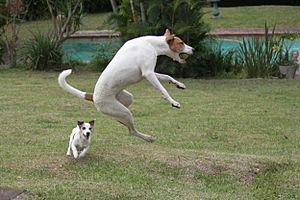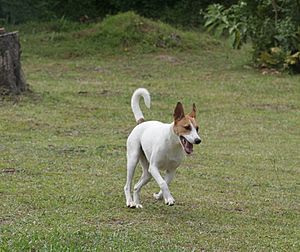Africanis facts for kids
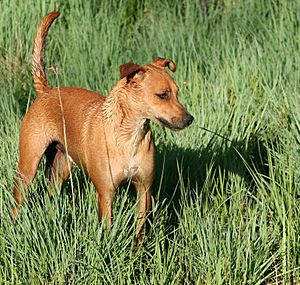
Africanis
|
|||||||||||||||||
| Other names | African Dog Bantu Dog Hottentot Hunting Dog Khoikhoi Dog Tswana dog Zulu Dog Katali |
||||||||||||||||
|---|---|---|---|---|---|---|---|---|---|---|---|---|---|---|---|---|---|
| Origin | Southern Africa | ||||||||||||||||
| Breed status | Not recognized as a standardized breed by any major kennel club. | ||||||||||||||||
|
|||||||||||||||||
|
|||||||||||||||||
| Notes | Recognized by the Kennel Union of Southern Africa | ||||||||||||||||
| Domestic dog (Canis lupus familiaris) | |||||||||||||||||
The Africanis is a special type of dog from Southern Africa. It is known as a "landrace," which means it developed naturally over many years. This happened without much human interference. People believe the Africanis comes from very old hunting dogs. These dogs were brought to the Nile Valley in ancient Africa. The name Africanis can also refer to all native dogs in Southern Africa.
While the Africanis Society uses the term "Africanis" for all African dogs, there are many unique types. These types were developed by different African groups. They have their own old names and special traits. These dogs are not just general "landraces." They are unique types that developed for specific reasons.
Contents
Meet the Africanis Dog
The Africanis is a medium-sized dog with a short coat. It is well-muscled and a bit longer than it is tall. These dogs can be any color. Sometimes, they even have a ridge of hair along their back. There is also a rare type with wire-like hair. Africanis dogs usually stand about 50 to 60 centimeters (20 to 24 inches) tall.
A Look Back: History of the Africanis
Dogs may have first been tamed in Europe or Siberia. The traditional African dog came from dogs that mixed with local wolves in the East. They arrived in Africa a long time ago. The earliest proof of dogs in Egypt is from 4700 BC. From there, dogs quickly spread along the Nile River into Sudan and beyond.
For thousands of years, the native San people in Southern Africa hunted without dogs. Domestic dogs first came to Southern Africa with the early Iron Age Bantu-speaking people. More dogs from the Nile region joined later migrations.
The oldest sign of a domestic dog in South Africa is from AD 570. These remains were found near the Botswana border. By AD 650, house dogs were present in the Lower Thukela valley. By AD 800, they were part of a Khoikhoi settlement.
For hundreds of years, these original dogs adapted to Southern Africa. They changed through natural selection. This means the strongest and best-adapted dogs survived. This created different types, all part of the same natural breed.
You can still find the true Africanis in tribal areas today. This is where people live in traditional ways. However, South Africa is changing fast. This affects rural areas. Some people also prefer owning fancy dog breeds. This puts the native Africanis at risk.
The Africanis Society of Southern Africa was created to protect these ancient dogs. Protecting the Africanis helps save biodiversity, which is the variety of life. The society is praised for its good work. The Africanis is now recognized by the Kennel Union of Southern Africa (KUSA). It is an "emerging breed," meaning it is becoming officially recognized.
Africanis Personality: What Are They Like?
Africanis dogs are friendly but not pushy. They are watchful and protect their territory. They are independent and protective of their space. However, they can be trained well. As they get older, they might become a bit grumpy. They can also be difficult when kept with many other dogs.
Keeping Africanis Dogs Healthy
Some people think Africanis dogs have natural protection against parasites. However, they can get sick from new diseases. These include serious illnesses like distemper and parvovirus. They can also get ticks. Rabies is also common among native dogs in Southern Africa.
It is very important to vaccinate any Africanis dog every year. This protects them from common diseases. They can get sick from diseases just like any other pet dog.
See also
 In Spanish: Africanis para niños
In Spanish: Africanis para niños
 | Sharif Bey |
 | Hale Woodruff |
 | Richmond Barthé |
 | Purvis Young |


